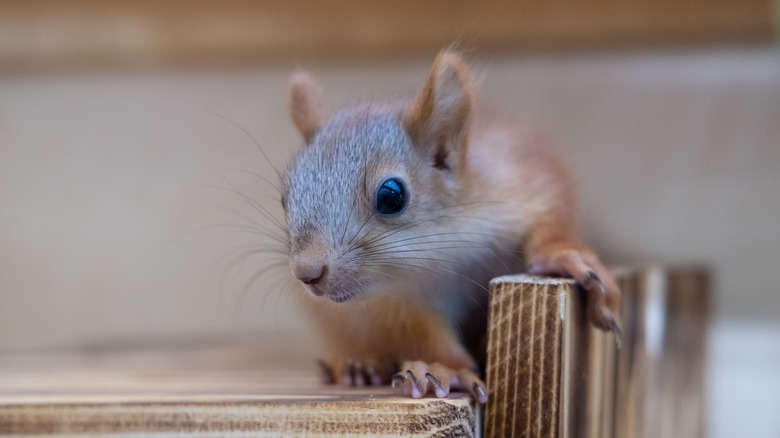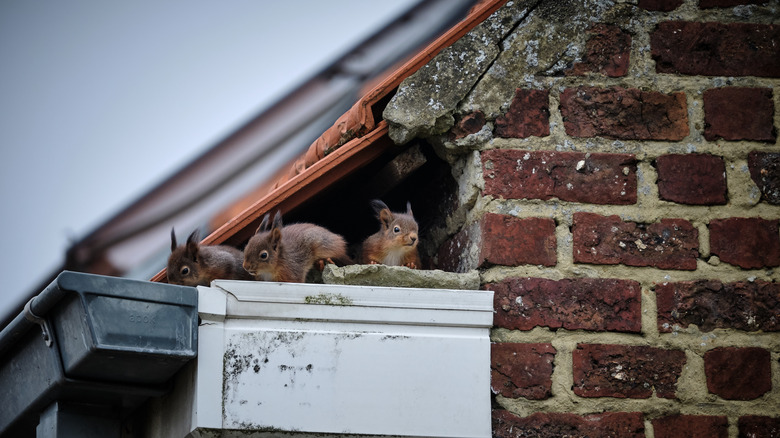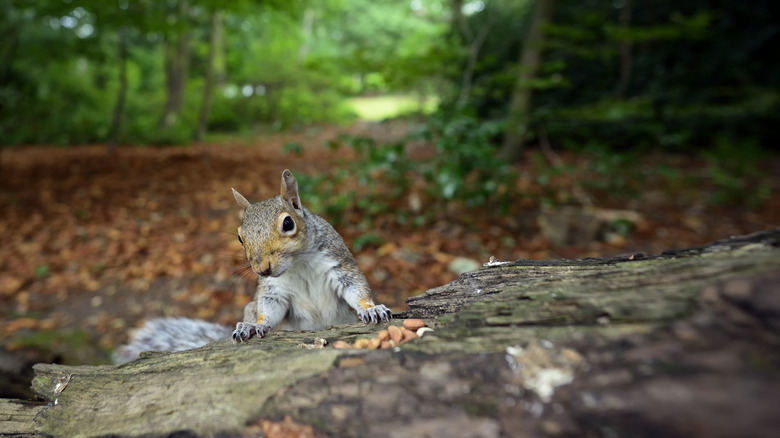Embracing Your Yard's Squirrels Has Downsides, So Know This Before Feeding Them
Squirrels are adorable, no one will disagree on this. Like many people, you've probably imagined reenacting your own Snow White moment, befriending the wildlife in your backyard, and embracing them like one happy little family. But not all types of backyard wildlife are equal. Attracting hummingbirds to your garden, welcoming bees and butterflies with blooming flowers, and making friends with the neighborhood squirrel aren't all the same. In fact, befriending squirrels isn't all fun and games. While squirrels are cute and fluffy, feeding them can be dangerous. There are three main issues with feeding squirrels that come into your yard. First, they might be carrying diseases, parasites, and bacteria. In addition, they can cause some serious damage to your home's structure when trying to set up their nest. Finally, feeding squirrels can strip them of natural instincts and reduce their fear of humans, which can be dangerous for them and you.
Squirrels can be such a nuisance that some homeowners have to look for ways to get rid of squirrels altogether. To prevent an infestation, people may choose to call pest control, buy squirrel-proof bird feeders, or plant deterrents in their yard. However, if you still wish to embrace these cute little pests, you should at least know the reasons to avoid feeding squirrels in your backyard.
The dangers of feeding squirrels
Feeding squirrels comes with several dangers; for one, squirrels tend to carry tons of diseases, and a few of them could be dangerous to humans. For example, diseases like ringworm or typhus could be transmitted to humans through bites. You might also hear that squirrels carry rabies, but there aren't any documented cases in the U.S. of them passing it on to humans. Overall, these diseases are rare and not the biggest concern when it comes to squirrels, but they're an important reminder that wild squirrels aren't pets.
On the contrary, squirrels' ability to wreak havoc on a house is documented extensively. These guys and their little hands and teeth are fantastic scavengers, and they'll use about anything to build a nest. Therefore, they'll treat your home as they do the forest: a place to be explored and torn through. Squirrels can break down insulation, rip linens, and chew on wires. This can quickly cause issues with your home's insulation and even create fire hazards.
Another major downside of feeding wild squirrels, especially if you're an animal lover, is that it can cause them to lose their natural instincts. This can create danger for humans as squirrels will stop being afraid of them. They might start approaching people asking for food, sometimes even being aggressive to get what they want. They may also begin to depend on humans for food, which will drive them out of the woods and into populated areas where they can get run over by cars or attacked by dogs.
How to feed squirrels safely
If you choose to feed wild squirrels despite the downsides, there are some ways to do it a bit more safely. First, decide exactly what you plan to feed them. Do not feed them human food, chips, junk food, or salted nut mixes. Raw peanuts may seem like a good idea, but they can be dangerous for squirrels. Instead, look for nuts that squirrels can safely consume and that they enjoy, like acorns, walnuts, pecans, and hazelnuts. You can also go beyond just nuts and feed them vegetables, fruits, and water, too.
Instead of hand-feeding squirrels, which can further disrupt their wild habits and bring them closer to your home, try to set up a dedicated feeding spot for them as far away as possible. Find a spot in your yard that's not near your house, garden, or a road, and leave some food in small quantities there for them to find. In some cases, squirrels might help themselves to your bird feeders. If that's an issue for you, placing some easily accessible food elsewhere might be a good way to distract them and make sure that birds get to eat their snacks. Alternatively, you can keep squirrels off of a bird feeder with squirrel-proof designs or clever DIYs.


